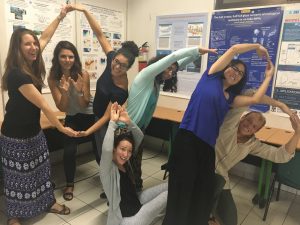
OCB-supported participants work together to form the letters “O” “C” “B” (Image courtesy of Lisa Maddison, IMBeR IPO).
Beatriz Dias is a Ph.D. candidate at the University of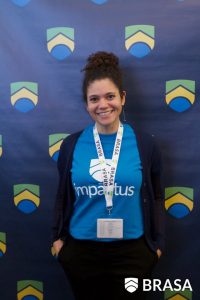 Massachusetts Amherst, Department of Environmental Conservation. Her work includes developing models to aid management decision making in Northeast US large marine ecosystem and Northern Brazil. Her work includes exploring different fisheries management scenarios effects on marine food webs and identifying monitoring priority areas for species of concern.
Massachusetts Amherst, Department of Environmental Conservation. Her work includes developing models to aid management decision making in Northeast US large marine ecosystem and Northern Brazil. Her work includes exploring different fisheries management scenarios effects on marine food webs and identifying monitoring priority areas for species of concern.
Participating in IMBeR ClimEco6 Summer School expanded my horizons to the importance of interdisciplinary research and collaborations to tackle the current issues impeding oceans sustainability. I was able to learn different aspects of social science, economics, and governance using current examples. The summer school was a life-changing experience, as I hope to incorporate these new research techniques to my quantitative modeling skillset and build future collaborations with my fellows’ summer school attendees.
Heather Welch is a research associate at t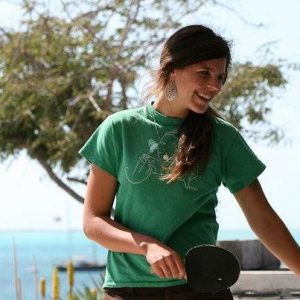 he Environmental Research Division (SWFSC, NMFS, NOAA). Her current work is developing and operationalizing dynamic management tools to allow for real-time human responses to changing environmental and ecological conditions. This work integrates remote sensing, species distribution modeling, and app development.
he Environmental Research Division (SWFSC, NMFS, NOAA). Her current work is developing and operationalizing dynamic management tools to allow for real-time human responses to changing environmental and ecological conditions. This work integrates remote sensing, species distribution modeling, and app development.
I found the IMBeR ClimECO summer school to be an incredibly valuable experience. I was exposed to concepts and methodologies outside my own discipline, and also gained contacts and friends from a wide array of geographies and areas of expertise. This course gave me the tools to approach my work with an interdisciplinary viewpoint.
Dr. Claudia Gabriela (GaBy) Mayorga Adame is a postdoc at the Marine System Modelling group of the National Oceanography Center in Liverpool, UK. She uses ocean circulation mo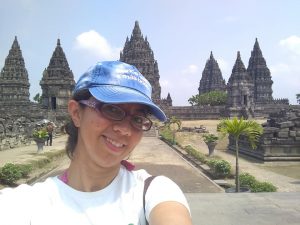 dels, biogeochemical and particle tracking models to understand bio-physical interactions in the coastal ocean. During her PhD program, she studied larval connectivity among coral reefs of the Mesoamerican Barrier Reef and the Kenyan-Tanzanian coasts. For her postdoctoral research, she studies the spatial and temporal scales of connectivity in the North Sea, focusing on evaluating the larval connectivity of sessile marine organisms that have colonized subsea oil and gas platforms. Her new project investigates how changes in currents and hydrographic conditions triggered by climate change will affect the marine ecosystem of the UK shelf seas and the key intermediate services (i.e. primary production, oxygen uptake, nutrient cycling, pelagic habitat) provided by the lower trophic levels.
dels, biogeochemical and particle tracking models to understand bio-physical interactions in the coastal ocean. During her PhD program, she studied larval connectivity among coral reefs of the Mesoamerican Barrier Reef and the Kenyan-Tanzanian coasts. For her postdoctoral research, she studies the spatial and temporal scales of connectivity in the North Sea, focusing on evaluating the larval connectivity of sessile marine organisms that have colonized subsea oil and gas platforms. Her new project investigates how changes in currents and hydrographic conditions triggered by climate change will affect the marine ecosystem of the UK shelf seas and the key intermediate services (i.e. primary production, oxygen uptake, nutrient cycling, pelagic habitat) provided by the lower trophic levels.
The IMBeR ClimEco6 summer school in Yogyakarta, Indonesia was a great learning experience. The program was truly international and interdisciplinary. The lecturers were experts on marine sciences, social sciences, and economics from top institutions in Australia, Canada, Brazil, France and Indonesia. Lectures were really well planned and presented in a way accessible to all. The complexity of the topics was build up nicely with examples specific to the marine science field. Most of the sessions included exercises that allowed the participants to interact. Working with participants from different fields and nationalities was very enriching and helped broaden my perspective. The summer school truly broadened my network and understanding of other fields. I not only learned about interdisciplinary research, I experienced it! I am grateful to the OCB Program for their support to make this experience possible for me.
Lauren Schmeisser is a 3rd year Ph.D. student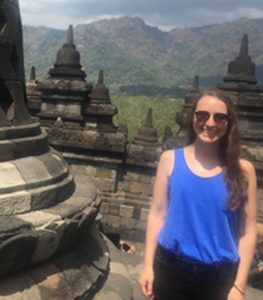 in Atmospheric Sciences at the University of Washington in Seattle. She studies ocean-atmosphere interactions during marine heat waves in the Northeast Pacific ocean. Using satellite data, buoy data, and climate model output, she aims to better understand potential feedbacks that contribute to persistence of these anomalously warm ocean events.
in Atmospheric Sciences at the University of Washington in Seattle. She studies ocean-atmosphere interactions during marine heat waves in the Northeast Pacific ocean. Using satellite data, buoy data, and climate model output, she aims to better understand potential feedbacks that contribute to persistence of these anomalously warm ocean events.
The IMBeR ClimEco6 summer school was an incredible learning experience packed with lessons on science communication, modeling, social science, and climate change impacts. For a student working across both atmospheric and ocean sciences, the interdisciplinary approach to our lessons was invaluable. I left the school with a great network of potential collaborators, a better understanding of interdisciplinary marine science, and newfound motivation to approach my research with novel techniques. I’m so grateful for the support received from OCB to attend this excellent summer school!
Zach Koehn researches how we can improve 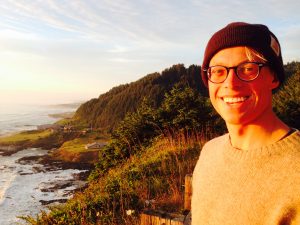 the connection between public health and sustainable fisheries as a Ph.D. Candidate in the University of Washington’s School of Aquatic and Fishery Sciences. You will find him on the water – in the early mornings or at sunset – every day he is not traveling. His current Ph.D. work uses quantitative and qualitative approaches towards 3 ends. First he analyzes national-level policy overlap between fisheries and health policies to meet food security and nutrition objectives. Second, Zach uses a mixed-methodologies approach to conduct a regional analysis focusing on increasing access and availability of underutilized fish on the U.S. West Coast to low income, low access communities, where diet-based disease burdens are high. Finally, he combines data sets on Life Cycle Assessment and nutritional composition to determine the environmental impact across terrestrial and marine animal food production systems in terms of their nutritive value. Prior to starting his Ph.D., Zach managed a community-supported, direct-to-consumer seafood distribution business on California’s central coast. Zach’s undergraduate and Masters degrees were both at Stanford University in philosophy and religious studies, where he evaluated cross-cultural identity under spiritual and social transformation in the works of Chinese-Daoist Zhuangzi and Italian-Christian Dante Alighieri. As he finished these degrees, he worked on campus for an ocean policy think tank Center for Ocean Solutions. In addition to his Ph.D., he participates in an intersectoral partnership between academia, private firms, and nonprofits to improve social responsibility in the seafood industry, and is a SESYNC graduate pursuit fellow working on understanding how urbanization mediates access of low-income communities to fishing areas for subsistence.
the connection between public health and sustainable fisheries as a Ph.D. Candidate in the University of Washington’s School of Aquatic and Fishery Sciences. You will find him on the water – in the early mornings or at sunset – every day he is not traveling. His current Ph.D. work uses quantitative and qualitative approaches towards 3 ends. First he analyzes national-level policy overlap between fisheries and health policies to meet food security and nutrition objectives. Second, Zach uses a mixed-methodologies approach to conduct a regional analysis focusing on increasing access and availability of underutilized fish on the U.S. West Coast to low income, low access communities, where diet-based disease burdens are high. Finally, he combines data sets on Life Cycle Assessment and nutritional composition to determine the environmental impact across terrestrial and marine animal food production systems in terms of their nutritive value. Prior to starting his Ph.D., Zach managed a community-supported, direct-to-consumer seafood distribution business on California’s central coast. Zach’s undergraduate and Masters degrees were both at Stanford University in philosophy and religious studies, where he evaluated cross-cultural identity under spiritual and social transformation in the works of Chinese-Daoist Zhuangzi and Italian-Christian Dante Alighieri. As he finished these degrees, he worked on campus for an ocean policy think tank Center for Ocean Solutions. In addition to his Ph.D., he participates in an intersectoral partnership between academia, private firms, and nonprofits to improve social responsibility in the seafood industry, and is a SESYNC graduate pursuit fellow working on understanding how urbanization mediates access of low-income communities to fishing areas for subsistence.
I was excited to learn that I would be attending IMBeR ClimECO, and am thankful to OCB for the support. I am grateful for the opportunity to travel to Indonesia to meet students and professors engaged in interdisciplinary research from all over the world, and to feel a part of this community. My favorite in-class moments surrounded discussions on interdisciplinarity, as well as learning best-practices for engaging with the general public and policymakers. I also loved to wake up to the Muslim dawn prayer over the city on Yogyakarta and common across Indonesia.
Shirley Leung is a 5th-year PhD student in Oceanography at the University of Washington. Advised by Dr. LuAnne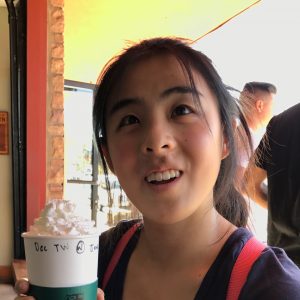 Thompson, her current research focuses on characterizing tropical Pacific oxygen variability and understanding its potential effects on tuna movements and spatial distributions both in the present-day and the future. She uses large-scale observational data sets and output from global coupled climate models to conduct her research.
Thompson, her current research focuses on characterizing tropical Pacific oxygen variability and understanding its potential effects on tuna movements and spatial distributions both in the present-day and the future. She uses large-scale observational data sets and output from global coupled climate models to conduct her research.
ClimECO6 was an incredible experience. It was such a privilege to get to learn from some of the world’s most prominent social and physical scientists working in the marine sphere. I came away with a much better idea of how to do more societally relevant research and how to foster relationships with stakeholders and those who would use my science. I also gained a new appreciation for social science methodologies and the nuances and challenges associated with conducting interdisciplinary work. The best part, however, was getting to meet scientists and fellow early-career researchers from around the world. The friendships and collaborations created were really invaluable!





